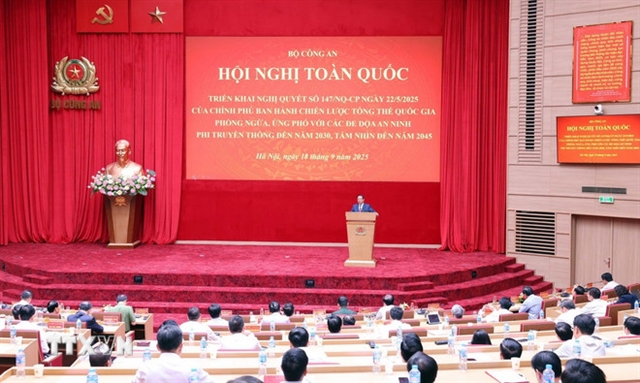 Politics & Law
Politics & Law


|
| Prime Minister Phạm Minh Chính delivers a keynote address at the national conference to implement measures to respond to non-traditional security threats held by the Ministry of Public Security in Hà Nội. — VNA/VNS Photo |
HÀ NỘI — The impacts of non-traditional security threats are universal, comprehensive and global, requiring international solidarity, unity and a strong emphasis on multilateralism, said Prime Minister Phạm Minh Chính.
The PM made the statement at a national conference to implement Government Resolution 147 on the National Strategy of Preventing and Responding to Non-Traditional Security Threats until 2030, held by the Ministry of Public Security in Hà Nội on Wednesday.
“No country can be safe if another country is under threat; no one can be safe if the world is unsafe,” Chính told attendees at the event.
He called for raising awareness of non-traditional security threats, along with communication, education and recognition of such risks.
At the conference, delegates confirmed that non-traditional security threats are an urgent global issue, with wide-ranging, profound and unprecedented impacts worldwide.
Việt Nam is among the countries most heavily affected by such threats, which are increasingly dangerous and far-reaching, influencing a variety of areas including economy, politics, culture and society as well as defence and security.
The resolution signed by the PM on May 22 represents a pioneering step for Việt Nam, demonstrating the strong political determination of the Party and the State, enhancing national credibility and showing responsibility before the international community in addressing global challenges.
The strategy identifies eight major guiding principles, as well as objectives for 2030 and a vision to 2045.
Its overall goal is to foster unity in awareness and action across the political system and society regarding the seriousness of non-traditional security threats, and their broad impacts on national development and defence.
Step by step, Việt Nam aims to become a country with the effective governance capacity to manage these risks, ensuring people’s safety and firmly protecting national interests. It also aims to actively propose initiatives and work with other nations to uphold the country’s role as a responsible member of the international community in tackling global security challenges.
Speaking at the conference, PM Chính stressed the need to strengthen forecasting and early warning regarding non-traditional security threats, supported by research and thorough understanding of the situation to propose appropriate solutions.
He emphasised that an overarching strategic task is to ensure security, safety and people’s well-being.
The goal is to prevent risks and avoid incidents. If an incident occurs, it must be handled swiftly and effectively.
With prevention as a foundation and response as an urgent and regular task, the PM stated that measures must be comprehensive, scientific and people-centred, as the people are both the target of protection and active participants in prevention and response efforts.
In the near future, he said, raising awareness about non-traditional security threats will be crucial, along with communication, education and identification of such risks.
PM Chính also called for further improvement of legal frameworks to ensure comprehensive and consistent prevention and response.
In addition, he stressed the importance of enhancing forecasting and early warning capacity, using science-based data systems for non-traditional security to enable intelligent responses.
A national index on security, safety and well-being should be finalised to serve as a foundation for risk warnings and preventive action, he said.
The PM also requested resource investment be focused and prioritised and international cooperation be stronger, and reaffirmed Việt Nam’s commitment to being a responsible and active member of the international community, contributing to building a peaceful, stable and sustainable global environment.
The Ministry of Public Security was asked to focus on training and capacity-building for officials involved in prevention and response, and to coordinate with other ministries and sectors to develop an action plan for the National Strategy.
Senior Lieutenant General Nguyễn Hồng Thái, a member of the Party Central Committee and Deputy Minister of National Defence, recommended quickly completing a system of policies, laws, leadership mechanisms, command and management for non-traditional security responses, ensuring alignment with the streamlined organisational structure.
Thái emphasised the need to clearly distinguish between non-traditional security response activities and civil defence to avoid overlaps in leadership, command and management.
He also proposed issuing legal documents to concretise the 'three proactives': proactive planning, proactive personnel and proactive means, as well as the 'four on-the-spot principles' of on-the-spot command, on-the-spot forces, on-the-spot supplies and equipment, and on-the-spot logistics, to ensure timely mobilisation of resources in addressing non-traditional security threats. VNS




